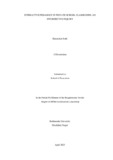
Please use this identifier to cite or link to this item:
https://hdl.handle.net/20.500.14301/300| Title: | INTERACTIVE PEDAGOGY IN PRIVATE SCHOOL CLASSROOMS: AN INTERPRETIVE INQUIRY |
| Authors: | Joshi, Karunakar |
| Citation: | Joshi,K.(2023). Interactive pedagogy in private school classrooms: An interpretive inquiry. |
| Issue Date: | Apr-2023 |
| School: | SOED |
| Department: | DOEL |
| Level: | M.Phil. |
| Program: | MPhil in Educational Leadership |
| Abstract: | Teacher-student interaction in the classroom is the foundation for students' intellectual, emotional, and behavioral growth. Students collaborate in groups, think critically, assess problems logically, and change their behavior since 21st-century schools prioritize similar instructional approaches. Based on such norms, this research explores how interactive pedagogy is perceived, what challenges teachers face while implementing it, and how these can improve the context of private schools in Nepal. Eight participants from two private schools participated in the study, including the two principals, two teachers, and four students. I delimited this study in classroom interaction that was interpreted through the theory of social constructivism and the theory of reality pedagogy. This qualitative study was based on an interpretive design that employed classroom observation and in-depth interviewing techniques to gather the information. The research participants considered interactive pedagogy a cutting-edge strategy that enhances institutional strategies, increases the capacity to solve challenges, offers more vital skills to examine problems constructively, and produces better learning outcomes. The study found that the teachers lacked adequate training and knowledge of interactive pedagogy. However, they have employed class discussion, question-answer sessions, and material demonstrations to the best of their ability and expertise. They have also started using project work and presentations to involve students in the learning process. Furthermore, the research found that the biggest obstacles to successfully using interactive pedagogy in classroom instruction were lengthy courses, inadequate training, part-time teachers, and an examination- focused educational system. Additionally, schools can successfully implement interactive pedagogy by overcoming obstacles. In that case, they might be able to transition from traditional teaching to modern student-centered instruction to fully engage students, enabling them to think more critically and apply better ideas in different learning contexts. Keywords: classroom interaction, interpretive inquiry, social constructivism perception and practice, interactive pedagogy, collaborative learning |
| URI: | https://hdl.handle.net/20.500.14301/300 |
| Appears in Collections: | Dissertation |
Files in This Item:
| File | Description | Size | Format | |
|---|---|---|---|---|
| Wcc- Karunakar Joshi's Thesis for Printing.pdf | 1.15 MB | Adobe PDF |  View/Open |
Items in DSpace are protected by copyright, with all rights reserved, unless otherwise indicated.